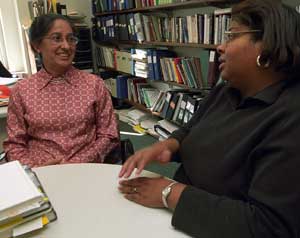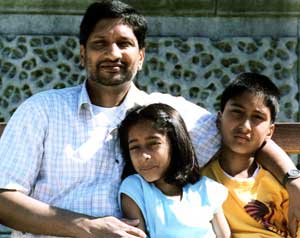It came down to three choices: botany, chemistry or zoology. So, logically, Shanta Pandey chose social work.
“I always wanted to be in a helping profession, but after completing my pre-med undergraduate studies, I realized that I didn’t want to be a doctor. I didn’t like being around blood,” she says. “The only other options I had to continue my studies at Tribhuvan University in Nepal didn’t appeal to me, and I didn’t know what I was going to do until I heard about the social work profession through the School of Social Work at Delhi University.”
Pandey, Ph.D., associate professor of social work in the George Warren Brown School of Social Work, left Nepal and dove into her graduate studies at Delhi University.

“It was a delight,” she says. “I was thrilled to get a chance to be part of the curriculum.”
After earning a master’s in social work, Pandey returned to Nepal to work on a community development project funded by United States Agency for International Development (USAID). The focus of the project was conservation and management of natural resources including water, forest, energy and livestock.
The USAID project sent Pandey to rural Nepal, where she saw firsthand how difficult it was for women to obtain basic necessities such as water and fuel.
“It was an eye-opening, amazing experience,” she says. “My father was our village headman, and I grew up thinking life was perfect. When I went to rural Nepal, I saw young women shouldering the responsibility of providing everything for their families because their spouses were serving in an army or deceased.
“The project showed me how challenging it is to implement community development projects and made me ask, ‘What can be done for these women who are trying to raise children? What can make their lives easier?'”
Melvin Goldstein, Ph.D., the John Reynold Harkness Professor of Anthropology at Case Western Reserve University, was doing research in Nepal, met Pandey, and encouraged her to apply for a doctoral program in social work.
“I thought it was a great idea, and a short time later I was in Cleveland, Ohio, earning my doctorate,” she says.
At Case Western, her research interests began to include poverty in the United States.
“Poverty in the U.S. is scary,” she says. “A disturbing aspect of the U.S. poverty is not just being poor but being deprived of opportunities. U.S. poverty is concentrated in certain neighborhoods and among certain demographic groups.
“For instance, there is a higher concentration of female-headed households in the very poor neighborhoods, and these women and their children are deprived of opportunities for integration, education and upward mobility.”
After completing her doctorate, Pandey accepted a faculty position at the University of Nevada. A year later, she joined the faculty at Washington University, where her research expanded to include how to empower people, especially women, to get out of poverty.

“I wanted my research to go beyond how people can get basic necessities to how they can permanently get out of poverty,” she says.
One of Pandey’s most remarkable studies looked at the impact of 1996 welfare reform legislation in the United States. With her colleagues, Pandey followed 450 families on American Indian reservations and 162 families in rural Missouri to study what happens to families who live in extreme poverty.
“We were able to document some of the limitations of the legislation as the states and tribes began administering their welfare programs,” she says. “For instance, states are not required to provide matching funds to tribes if they choose to administer their TANF (Temporary Assistance for Needy Families) programs.
“Also, the effect of the legislation has been mixed in terms of reduction in welfare caseload. Caseloads on reservations are dropping at a much slower rate than they are nationally. On some reservations, caseloads are actually rising. Some of the barriers to welfare exit include lack of job opportunities, lack of education and job experience, and lack of support services including child care and transportation.”
Pandey’s research looks at how powerful education is in reducing poverty and what policy changes need to be made to encourage higher education for single mothers.
“A bachelor’s degree is extremely powerful for women with children,” she says. “With a bachelor’s degree, single mothers are nine times more likely to live above poverty than single mothers without a high-school degree.”
“I refuse to agree with the idea that poor, single mothers are not motivated to get out of poverty. There are over 2 million single parents enrolled in two- and four-year colleges, many of whom are poor. Universities, communities, states and the federal government need to develop programs that encourage single mothers to continue their education.”
Pandey’s work in the United States continues to have a link back to Nepal. She is in the process of developing a proposal to study the demography and social service needs of increasing number of Nepalese immigrants who are coming to the United States primarily due to the Maoist insurgency in Nepal.
“Professor Pandey’s interests, experience and scholarship represent an extraordinarily good fit with the School of Social Work’s portfolio of both domestic and international studies,” said Edward F. Lawlor, Ph.D., social work dean and William E. Gordon Professor. “Her interests connect to our school’s research and teaching on poverty, family and welfare policy, American Indian studies and international development. Her ability to weave these interests together in her research and teaching is so impressive.”
Pandey has found a home at Washington University.
“I love this place,” she says. “I feel so fortunate to have energetic and wonderful colleagues and students. The student body at the School of Social Work becomes more interesting every year. I love to hear about the great work they do after they graduate. The students make me want to work even harder.”
Pandey has a particularly close relationship with one colleague, however. Her husband, Gautam Yadama, Ph.D., also is an associate professor in the School of Social Work. Pandey and Yadama met while studying at Case Western.
Outside WUSTL, Pandey, Yadama and their children, Sagar and Aishwarya, love to travel around the world.
“Every year we try to go to a country we haven’t been to yet,” she says. “This is one of the ways I keep educating myself. I always learn something new on our trips.”
This year, Pandey and her family traveled to Vietnam and to the Indian Himalayas. She would like to plan a family trip to Scandinavia in the near future.
Although Pandey misses the mountains in Nepal, she has “come to enjoy the flatlands of St. Louis.”
“It’s hard not to love St. Louis when you can enjoy the great parks in town and live near such a beautiful campus.”